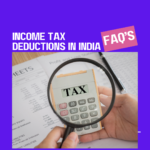How is short-term capital gains tax and long-term capital gains tax is calculated?
1. Short-Term Capital Gains (STCG) Calculation
📌 Formula:
STCG = Sale Price − (Purchase Price + Improvement Costs + Selling Expenses)
🔹 Tax Rate: Added to your total income & taxed as per your income tax slab.
🔹 Example:
- Property bought for ₹50 lakh & sold for ₹70 lakh after 1.5 years.
- Selling expenses: ₹2 lakh
- STCG = (₹70L - ₹50L - ₹2L) = ₹18 lakh
- If you fall under 30% tax slab, tax = ₹5.4 lakh + cess/surcharge.
2. Long-Term Capital Gains (LTCG) Calculation
📌 Formula:
LTCG = Sale Price − (Indexed Purchase Price + Indexed Improvement Costs + Selling Expenses)
🔹 Indexation: Adjusts purchase price for inflation using Cost Inflation Index (CII).
🔹 Tax Rate: 20% with indexation benefit (or 12.5% without indexation, per latest updates).
🔹 Example:
- Property bought for ₹50 lakh in 2015 (CII = 254) & sold for ₹1 crore in 2025 (CII = 389).
- Indexed Purchase Price = (₹50L × 389) / 254 = ₹76.69 lakh
- Selling expenses: ₹3 lakh
- LTCG = (₹1 Cr - ₹76.69L - ₹3L) = ₹20.31 lakh
- Tax = ₹4.06 lakh (@20%) + cess/surcharge.
What is indexation, and why is it important for LTCG?
🔹 Indexation is a method that adjusts the purchase price of an asset (like property) for inflation using the Cost Inflation Index (CII).
🔹 This reduces taxable Long-Term Capital Gains (LTCG) and lowers the tax liability.
Why is Indexation Important?
✅ Reduces Taxable Gains – Accounts for inflation, so you pay tax only on real profits.
✅ Lowers LTCG Tax – Since indexed cost is higher, taxable capital gains become lower.
✅ Increases Tax Efficiency – Helps property sellers save tax legally under Section 48 of the IT Act.
Are there exemptions available for long-term capital gains tax?
Yes! The Income Tax Act provides exemptions to reduce or avoid LTCG tax when selling property.
1. Section 54 – Exemption for Residential Property Sellers
✅ Who can claim? Individuals & HUFs
✅ Condition:
- Reinvest LTCG in another residential property in India.
- Buy within 1 year before or 2 years after selling.
- If constructing, complete within 3 years.
✅ Max Limit: 1 residential property (or 2 if LTCG ≤ ₹2 Cr).
✅ Lock-in Period: If sold within 3 years, exemption is reversed.
2. Section 54EC – Exemption via Capital Gains Bonds
✅ Who can claim? Any taxpayer (individuals, HUFs, companies, etc.)
✅ Condition:
- Invest up to ₹50 lakh in NHAI or REC bonds.
- Invest within 6 months of selling property.
✅ Lock-in Period: 5 years (cannot sell before).
✅ Tax Benefit: No LTCG tax if fully invested.
3. Section 54F – Exemption for Any Asset (Not Just Property)
✅ Who can claim? Individuals & HUFs
✅ Condition:
- Sell any capital asset (like land, gold, shares) & reinvest entire sale proceeds in a residential house.
- Buy within 2 years or construct within 3 years.
✅ Max Limit: Only 1 house at the time of sale.
✅ Partial Exemption: If reinvesting part of the proceeds, exemption applies proportionally.
What is Section 54B, and who can claim it?
Who can claim it?
✅ Individuals & Hindu Undivided Families (HUFs)
✅ Applicable when selling agricultural land & reinvesting in another agricultural land.
Conditions to Claim Section 54B Exemption
1️⃣ Type of Land Sold: Must be used for agricultural purposes for at least 2 years before the sale.
2️⃣ Reinvestment:
- The capital gains must be used to buy another agricultural land.
- Purchase must be within 2 years of selling the old land.
3️⃣ Lock-in Period: The new agricultural land must not be sold for 3 years.
4️⃣ Amount of Exemption: - If full capital gain is reinvested → Full exemption.
- If partial reinvestment → Exemption applies only to the reinvested amount.
Example of Section 54B
👨🌾 Farmer sells agricultural land for ₹40 lakh (owned for 5 years).
👨🌾 Buys new agricultural land for ₹30 lakh within 2 years.
✔ Exempted LTCG = ₹30 lakh
❌ Taxable LTCG = ₹10 lakh (₹40L - ₹30L)
What is the Capital Gains Account Scheme (CGAS)?
The Capital Gains Account Scheme (CGAS) allows taxpayers to temporarily park their capital gains when they haven’t yet reinvested in property or bonds but want to claim tax exemptions under Sections 54, 54B, 54F, etc..
✅ Preserves tax benefits if reinvestment is pending.
✅ Ensures exemption under LTCG provisions even if the purchase/construction takes time.
✅ Avoids paying tax on LTCG while waiting for the right reinvestment opportunity.
Are capital gains on the sale of farmland taxable?
The taxability of capital gains on farmland depends on whether the land is classified as rural or urban agricultural land.
1️⃣ Rural Agricultural Land – ✅ Exempt from Capital Gains Tax
✔ Not considered a Capital Asset under Section 2(14) of the Income Tax Act.
✔ No capital gains tax applies when sold.
📍 What qualifies as rural agricultural land?
- Located outside municipal limits (at least 8 km away from a municipality).
- Municipality population below 10,000.
2️⃣ Urban Agricultural Land – ❌ Taxable Under Capital Gains
✔ Considered a capital asset, so capital gains tax applies when sold.
✔ Taxation:
- Held ≤ 2 years → Short-Term Capital Gains (STCG), taxed per income slab rates.
- Held > 2 years → Long-Term Capital Gains (LTCG),
12.5% without indexation: Tax is levied at a flat rate of 12.5% on the gains without adjusting for inflation.
20% with indexation: Tax is levied at 20%, but the cost of acquisition is adjusted for inflation (indexation), effectively reducing the taxable gains.
What expenses can be deducted when calculating capital gains?
When selling a capital asset (property, land, shares, etc.), certain expenses can be deducted from the sale price to reduce taxable capital gains.
1️⃣ Purchase-Related Expenses (Acquisition Cost) 🏡
✔ Stamp duty & registration charges
✔ Brokerage or commission paid to an agent
✔ Legal fees for purchase agreements
2️⃣ Improvement Costs (Only for LTCG) 🛠️
✔ Renovation, construction, or modification costs (e.g., adding a floor, boundary wall)
✔ Architect or contractor fees
🔹 Note: Must be a capital improvement, not routine repairs.
3️⃣ Selling-Related Expenses 🚪
✔ Brokerage or commission paid on sale
✔ Legal & documentation charges
✔ Advertisement expenses for selling
✔ Travel expenses related to the sale
4️⃣ Cost Inflation Index (CII) Benefit 📈 (For LTCG Only)
✔ Indexed Purchase Price & Improvement Costs – Adjusted for inflation using Cost Inflation Index (CII).
✔ Helps reduce taxable LTCG significantly.
Can I claim exemptions under multiple sections simultaneously?
Yes! You can claim exemptions under multiple sections of the Income Tax Act simultaneously, as long as you meet their respective conditions.
📌 Example 1: Combining Section 54 & Section 54EC
✔ You sell a residential property and earn LTCG of ₹80 lakh.
✔ You buy a new residential house for ₹50 lakh (Section 54).
✔ You invest ₹30 lakh in NHAI/REC bonds (Section 54EC).
✔ ✅ Full LTCG of ₹80L is tax-exempt! 🎉
📌 Example 2: Using Section 54B & Section 54F Together
✔ You sell urban agricultural land and earn ₹40 lakh LTCG.
✔ You buy another agricultural land for ₹20 lakh (Section 54B).
✔ You buy a residential house for ₹20 lakh (Section 54F).
✔ ✅ Entire capital gain is tax-free! 🎉
Key Points to Remember
✅ You can claim multiple exemptions if conditions for each section are met.
✅ Reinvestment deadlines & lock-in periods apply – Plan properly!
✅ CGAS (Capital Gains Account Scheme) can be used if reinvestment is pending.
❌ One exemption per asset category (e.g., you can't claim both Section 54 and 54F for the same capital gain).



